 The internet is basically a computer network that spans the entirety of Earth - well, roughly. That's all it is. Anything you can do on the internet, you could do (probably a lot faster) in the privacy of your own home with a bunch of cheap PC's and a home network. But to keep me from spreading further technical onto details such as "points" "WANs" (which is what the internet is), "Nodes", or how Al Gore did not invent the internet, just funded it's expansion....I digress.
The internet is basically a computer network that spans the entirety of Earth - well, roughly. That's all it is. Anything you can do on the internet, you could do (probably a lot faster) in the privacy of your own home with a bunch of cheap PC's and a home network. But to keep me from spreading further technical onto details such as "points" "WANs" (which is what the internet is), "Nodes", or how Al Gore did not invent the internet, just funded it's expansion....I digress.
Basically, the internet is what you are looking at right now, computers connected to computers, spanning the globe. All of these computers "talk" to each other over this vast network, all for different reasons, purposes, and creations. That's really the base of it. This website is on the internet, so is Facebook, so is Netflix, so is microsoft.com, or contoso.com, or A.I. creation tools. The company you work for is on the internet, my company I work for, is on the internet. Your phone connects to the internet over your "data plan", your computer connects via an "ISP" or "Internet Service Provider" such as Comcast, Charter, Spectrum, or Frontier Cable - which those are the *things* you pay a monthly fee for.
Why does the internet cost money, why isn't it free? Becuas e in order for your computer to access the internet, it has to connect to another, smaller, more specialized computer called a "modem" (accuracy of this is questionable at best these days but that's what most people call it, it's really called a "gateway" these days in most cases - the old Modems actually were Modems, and actually were not tiny computers), which then directs your internal home network tracffic to the ISP, who then regulates your connection on their side, and allows your computer to pass to the greater internet. You're paying for the privledge to use the company's servers to access the internet. That's how it works for everyone, from some poor guy in the middle of nowhere with a copper landline stuck on 56K Dial-Up, all the way to a major Mega Corproation who needs to play 2 or more ISP bills every month to have multiple high speed internet connections from their site for redundancy to assure operations if something breaks. The information may be free, but the privledge to access it is not - that's the part in the 1990's they didn't tell you about the internet (though there are some small, free, dial-up ISPs you can use). Prior to all this, you needed to be in MENSA, a IVy League College with a massive tech department (read M.I.T.) or a part of NASA or Atari to have access to the internet.
The World Wide Web (WWW) Explained
The most used part of the internet is the "World Wide Web" - so much so like how we called video-games Nintendo in 1991, or some people call coffee "Keurigs", the "World Wide Web" most people simply call the internet, which isn't too far off these days, but it's not exactly accurate.
The World Wide Web is accessed through a piece of software called a "Web Browser". I'm sure you'll find these familiar, but here's a list of web Browsers Below, some obsolete, some modern, all in the mainstream to some extent, and in the heaviest use across home and work environments...
| ICON & NAME
| Type of Computer Available On
| Description
|
Google Chrome
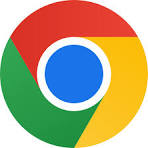
| PC
Mac
Linux
Chromebook
Android
| Google Chrome is currently the most popular Web Browser on the internet. It's owned by Google Corporation (the same company that owns GMAIL, YouTube, Google Search, Google Glass, and about 1001 other "techie" things), and based on a "engine" called "Chromium" that is open source (but at times suspicious outside of the Chrome and Edge formats). Their browser is most popular because it belongs to Google, and people only really trust corporations that make billions of dollars rather than want to read or listen to people who know better. Not necessecarilly bad, but it doesn't follow the principles the open internet was built upon, but it works for most common use, and corporations have adopted it. Chrome is found on everything, and is the default browser on...well...obviously Android Phones (also owned by Google), and Chromebooks (again, owned by Google).
|
Microsoft Edge
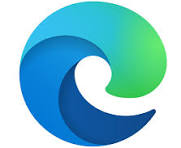
| PC
| Microsoft Edge is a web browser created by Microsoft in 2013 as a part of Windows 8, and later was re-marketed now as a Chromium based browser insteade of using Microsoft's own code after initial releases failed to stick. Currently, Microsoft Edge is the default browser on any Windows 11 computer, and is the authoritatively pushed choice on Windows 10 as Microsoft Internet Explorer still exists on 10 as a "compatibility tool" (Because Microsoft can't lie that even Edge is incapable of fully replicating the functionality of kludges such as that nightmare "Active X COntrols" that M$ put out in the 90's that lead to this page's rants about Microsoft. However, if you are using a computer at work, most likely you are using a (most likely DELL) PC with Microsoft WIndows and therefore Microsoft Edge on it. The reason why is because your I.T. Department can manage and regulate how Edge is used within an organization using such magical sounding things such as "Group Policy" or "Azure". At home, most people install Chrome in it's place, not realizing they are just downloading a brother from another mother to Edge.
|
Mozilla Firefox
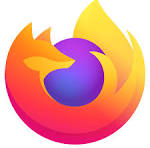
| PC
Mac
Linux
Chromebook
Android
| Mozilla Firefox is an offshoot of NCSA Mosaic and Netscape NAvigator. Netscape never died, it just morphed with Mozaic and Mozilla to become Firefox sometime around 1999. It's OpenSource, run by a non-profit, and tends to follow the principles the open internet has been based on since the very beginning. It has all the same features and same functionality as the other two above. It's my preferred browser of choice, but any of these in this list work fairly well as I use them all with some regularity being an I.T. guy.
|
Apple Safari
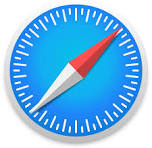
| Apple MacOS
Apple iOS
VisionOS
iPad OS
| Apple Safari is Apple's own proprietary web browser rolled into their various operating systems for their various proprietary devices. I'm not too terribly familiar with it, but I really shouldn't need to explain much about it. Again, most people just ignore it and install Google Chrome on their devices these days because "it's better" or so they say. Again, whatever floats your boat. Safari probably has some advantages and cons on it's own, but I'm not aware of any except those that come with running a device that requiress you to login to an account with the company that makes the device to make your usage "legit".
|
Microsoft Internet Explorer
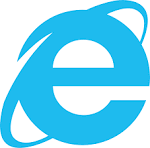
| PC
Old IBM Compatible PCs
| Microsoft Internet Explorer is the old dying kludge of a "Compatibility Tool (that once was a web browser)" included with WIndows 10 and older. It only runs on Windows PCs, always has since 1994 when the earliest versions started being offered for free for Windows 95, it carries a long, long, long line of security issues, rendering problems with some websites, a DOJ AntiTrust Lawsuit in 1998, and honestly, is probably something Microsoft is trying to sweep into the past to be forgotten. And honestly, it wasn't all bad, I was a MSIE user between 2002 and 2005 - when I made the move to Firefox, and I didn't have any problems, just as long as I kept on MSIE with a fine-tooth comb tuning, tweaking, and modding my settings to death to make it the safest I could make it as a lowly budding young I.T. guy.
|
E-mail
E-mail is basically sending written (well, typed) correspondance to other people using either an E-mail client (Mozilla Thunderbird or Microsoft Outlook usually), or a web browser based "webapp" that acts like a desktop e-mail client, but runs in a web browser like those above. It's like writing a letter, except instead of an address like 1060 West Addison Pkway, Ny Ny, 20292 or whatever....you send via an E-mail address which can range from steven.j.smith@somecorporation.com to old schoolers like me who'll make something crazy up like "NightmareGonzo843@shoopdoop.net". The key to knowing the difference between a website and an e-mail address is the "@" in the middle of the e-mail address vs. the HTTP/HTTPS at the beginning of a web address, and the .com, .org, .info, .net, .whatever at the end of it.
If you are at work, you're probably using Microsoft Outlook because network admin wants to know if you're wasting bandwidth sharing porn so he can notify your manager for sucking away gigabits of bandwidth away from work with your inane bullshit. If you are at home, most likely you just go to "www.gmail.com" and it pops up (and probably you don't remmeber you rpassword either or use a password manager to manage them anyway so that problem is null).
Social Media
Social Media is a series of content hosted by the "host" - ie Meta (Facebook, Instagram, etc.), Bluesky, Twitter, or whatever, and more often accessed and used on an "App" on your phone, but still at least accessible via a computer. So what ARE these social media things?
| ICON & NAME
| Type of Computer Available On
| Description
|
Tik Tok

| Tik Tok is a Chinese company owned social media site similiar to Instagram Reels. Basically, users create short videos to share with friends, family, and the world, for public critique, and you too can do so. You also can just run around and swipe up and down and watch videos. That's as much as I know since I've never used it. It tends to be popular with Gen Z and younger.
|
Instagram

| Instagram is a social media site similiar to Tik Tok except it's original claim to fame was posting pictures with a short caption under it for people to show approval by clicking a "like" button under it. Eventually they tried to keep their mojo by adopting Tik Tok's activities in the form of "INstagram Reels", which again, are just short videos posted by Instagram users for public critique. Instagram is owned by "Meta" - which means it's owned by Mark Zuckerberg (who also owns Facebook). It's primary demographic seems to be Millennials and older Gen Z, though some of GEn X also gets on there to dick around quite a bit as well. I use Instagram. It's fun, if you're responsible with it. STRAIGHT MEN, BI, AND LESBIANS - Be fuckin' careful, if you see a woman on Instagram in your feed put there by the algorithm DO NOT STOP - or the next thing you know, the Algorithm will fill your feed with lots of women! Otherwise you will *ahem* need to do some cleansing by looking up a whole lot of other stuff to show your disinterest in the O.F. pick-mes to the algorithm to get it to stop bombarding you with this shit (blushes). I speak with experience from this. My wife thinks it's cute and hilarious though I personally think it's a bit disheartening that maybe the old gag song "The Internet is for Porn" is not a joke but an observation. Otherwise, pretty fun.
|
Facebook

| Facebook is a Social Media site owned by Mark Zuckerberg's Meta company, and is the longest standing of the platforms still in the public eye. Facebook is basically a wall of "posts" you can make - just like above, though more of a focus on text than pictures, videos, and other content (Ithough you can do that too). There's groups to join, games to play, and political debates to get in fights over (especially after the 2024 election). Again, the Algorithm - the mathmatical nightmare that determines what the site thinks you should see - is a nightmare, but this time, I get to have a nice barriage of Donald J. Trump crap all day long on there - and I don't want to see that fucker, I want to see Fender Jaguars and old PCs! Facebook I still have but I would have left it a long time ago if not for family pretty much forcing me to keep my account because somehow Millennials, Boomers, and Gen X seem to think that deleting your Facebook account as a Married man means you just "broke Up" - when it really means "I'm tired of this shit, call/text me instead!" - so probably better not to join this one, it's time for it to die out anyway. It's primary demographic are boomers, Gen X, and older Millennials who like to argue about politics, and pretend they are the most perfect parent with the most perfect kids in the world.
|
Twitter (**sigh** okay okay "X")

| Twitter....err....X (pronounced "ecks") is sort of a shoter-form version of Facebook more aimed at people acting like important celebrities instead of family members. I've never used it, but it seems that's what most people use it for. It's owned by "The Boring Company" I believe, or at least Elon Musk himself. Honestly, even before Elon bought Twitter, I said "Twitter is for Twats". It's popular with a wide range of demographics but seems to have lost some of it's sparkle to anyone who doesn't wear a funny little red hat.
|
Bluesky

| A new Twitter-alike created in 2025 to compete with Muskrat's newly acquired playtoy scared away all the Democrats from it after his involvement with the Trump Administration. So it's basically a "blue Twitter" of sorts. I've been tempted to join, though I'm independant with a lowercase "i" - I'm not WANTING to get political, but I hope through all this stuff, I show what a pariah Social Media can be, even if you don't use it like an ass-monkey yourself. It's demographic, like Twitter is less age-based, and more people who will hound you for driving a gas car (because you can't afford a EV), hound you over a couple's squabble and favor the girl over the guy regardless of red flags on her side, and pester you if anyone thinks you own a gun, all the while most likely posting while microdosing weed.
|
LinkedIn

| Further proof that the best way to get people to behave is threaten their ability to continue to live on the planet without the police "Assisting" you away from your homeless encampment. LinkedIn is about the closest thing to "normal" that social media can be. Now if my old bassist "todd" would stop trying to friend me on there (facepalm). Possibly the only useful one among the lot, because it's a mix of demographics, everyone is civil because god forbid your own personal weridness and flaws leak into your professional life, and it's for GETTING JOBS. Maybe Facebook, Bluesky, and the others should start to let corporations pilfer posters for positions in their companies....might fix the civility issues with Social Media.
|
Ya' know what, if I did what I wanted - I mean really really wanted - with this page, I'd not have mentioned "Social Media". Hence the unprofessional and snarky spin on it. But I have to because I'm telling you about the internet, and it's such a horrifyingly big part of it now (and one of the big reasons I created this Website instead of spending my time acting like a troll on Fakebook, boring people with long diatribes about 486s, guitars, and old TVs).
Streaming Media
A Streaming Media is a resource on the internet that delivers "Streaming" video to your computer or phone or tablet. These include sites like YouTube, Netflix, Amazon Prime (more on that in another section too), Hulu, Max (HBO), and what have you. You can even host your own Streaming media with a service like Plex if you are technically adept to do it (that's what I do, though mines internal use only).
YouTube and sites like it are basically social media sites that focus on long form videos, and were not originally considered so much social media as say Tik Tok or INstagram are. They were more made for sharing information, sharing videos with the world, sharing talents, and not being restricted under 15 minutes. Similar sites include Odysee and BitChute.
Movie Streaming like Amazon Prime, Netflix, and Hulu, are major corpoate websites focused on showing you full TV shows and movies by paying a monthly fee for access. This is what most people do instead of going to a theater or buying a VHS tape. However, it has caught fire in recent years because these companies have to make more room on their servers for other movies by removing some of them. That's not a defense, that's just what a guy who deals with network attached storage periodically and runs his own server at home understands.
The Beauty of the Internet
The beauty of the internet is through all these resources, and more, you can easily access information, useful information, via websites, streaming media, and occasionally social media. If you know how and where to look, and understand how it works. The longer it's been around, the more focused it's become on making the WWW the most used part of it and the primary vector for access. Back in the 1990's you had to access everything from all sorts of sources, like ytour Online Services Provider like AOL or Knowlogy would have their own set of easily accessed resources like a big ole' Kiddie pool for people who are scared of exploring the wild west that was the old internet, then there's Gopher, FTP, NTP for syncing your computer's clock, another client for Internet chat (which nobody does anymore, such as AOL Instant Message) - now most of that is handled through websites or through "Apps" on your phone or tablet (and rarely the computer).
Prior to the internet, you had at best, a "pen pal" who was most likely just in another part of the same country you were in. Nobody ordered things direct from China or Japan - at least, not normally. You had your local "Brick and Mortar" store you had to drive or walk to, pay actual cash at - which meant going to a BANK to pull out said cash, physically - and then going to the store, dealing with smarmy salespeople, limited stock that may or may not be in your favor, purchasing things with only magazines or friend's telling you if they were good or not. If you needed to do research, you got a library card or bought the Encyclopedia Brittanica, which was most likely a little out of date. If you were a "computer nerd" you maybe had some pokey PC that you used to access a "Bulletin Board System" to go talk to people all over the world and play "Door Games" with, but nothing like the diversity you have today.
The Ugliness of the Internet
|


 The internet is basically a computer network that spans the entirety of Earth - well, roughly. That's all it is. Anything you can do on the internet, you could do (probably a lot faster) in the privacy of your own home with a bunch of cheap PC's and a home network. But to keep me from spreading further technical onto details such as "points" "WANs" (which is what the internet is), "Nodes", or how Al Gore did not invent the internet, just funded it's expansion....I digress.
The internet is basically a computer network that spans the entirety of Earth - well, roughly. That's all it is. Anything you can do on the internet, you could do (probably a lot faster) in the privacy of your own home with a bunch of cheap PC's and a home network. But to keep me from spreading further technical onto details such as "points" "WANs" (which is what the internet is), "Nodes", or how Al Gore did not invent the internet, just funded it's expansion....I digress.